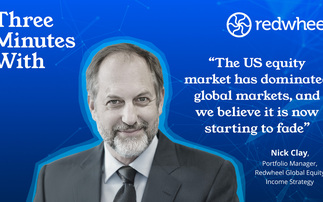Alasdair Ross, Head of Investment Grade Credit at Columbia Threadneedle Investments, gives his thoughts on how the market will bounce back post-pandemic
It's fair to say 2020 has been a year of considerable turmoil that few observers would have predicted. While the Covid-19 pandemic has caused mayhem across global markets and challenged the balance sheets of some previously solid businesses, others have emerged stronger.
Throughout the pandemic, government support has helped many of these businesses cope with the dramatic fall in revenue. Furlough schemes have staved off mass redundancies and state-backed loans have propped up balance sheets. But as these schemes wind down, how will the firms that make up IG credit markets cope? Could there be a series of defaults and downgrades amongst some of the market's leading lights?
DEFYING DEFAULTS
Alasdair Ross, Head of IG Credit at Columbia Threadneedle, says that while there might be some defaults or downgrades, it shouldn't be a major concern as a result of the makeup of the market. "If you think about IG markets, the biggest single sector is banks - and that is supported by a policy to manage losses. We'd expect credit quality to go sideways and weaker players will be encouraged to merge with stronger ones. That's almost 25% of the
global IG market.
"Then you've got sectors where actually the outlook is as good if not better than before, such as technology and food & beverage, which is 10% of the market. Largely unaffected sectors, such as utilities, telecoms and healthcare, add up to another 20% of the market."
Other industries that on the surface appear to have been badly hit by the pandemic have seen some bright spots. "Take real estate, which is 4% of the market but isn't really a homogenous sector as there are so many different sub-sectors," adds Ross.
"Warehouses and logistics have benefited from home delivery and the Amazon effect. Obviously if you're in retail or offices then the outlook is more difficult, but by now you are down to only 1% or so of the market."
"Even for sectors where the pandemic has negatively affected operations and earnings, many IG-rated companies have significant levers they can pull in order to react to that.
A combination of cost-cutting, capex phasing, working capital management and inorganic activity such as asset sales, dividend cuts or equity raises can and will be utilised to defend balance sheet credit quality. IG ratings are based on a combination of strong market positions, diversified operations, and resilient balance sheets and this combination is what gives many IG companies the flexibility to adapt where required".
A POST-PANDEMIC BULL MARKET?
While much hope is being placed on a vaccine allowing businesses to get back to normal, Ross cautions that other factors might have a lasting effect on how they operate. "We shouldn't underestimate the fact that the pandemic may have changed behaviour in significant ways," he says. "Will we all go back to five days in the office or is home-working here to stay to some degree? Some sectors may benefit from these behavioural changes, like technology or food and beverage. However, it might put a question mark over the outlook and the business model of others."
At the same time, many global businesses have been bolstered by a policy response that has impressed many observers by its speed, scale and scope. With policymakers wanting to avoid an economic shock turning into a financial crisis, many of the support measures have specifically targeted keeping the credit channel open. While the policy response to the crisis in many countries has been widely praised for the speed at which it was deployed, easing economies off state-support might prove less rapid. "One thing we expect concerning policy tools is that typically they go on quicker than they come off," explains Ross. "The European Central Bank's corporate QE lasted much longer than was strictly necessary for market stress or for cost of debt of large European corporates. More recently we've seen the US Federal Reserve saying it would move to average inflation targeting, where even if inflation goes above 2%, interest rates won't be increased until we're above 2% for some time. So we expect this policy support to last for longer than it might be needed.
"Inflationary pressure is unlikely to emerge anytime soon for the market," adds Ross, despite what many observers predict. "Ever since 2009, when we've had loose monetary policy and then these extraordinary tools being used, such as yield curve control, QE, and direct buying of corporate bonds," Ross points out. "People have always talked about how it's surely going to be inflationary at some point and it hasn't."
CAUSE OF OPTIMISM
The IG market is currently offering investors decent value, adds Ross. "The spreads on IG globally are at 130 basis points over government bonds, which is at the long-run average. Yield levels on government bonds and cash rates are at all-time lows, and P/E ratios in the equity markets were at two decade highs because discount rates were so low. In that context an asset at long run average valuations - the credit spread - is not bad value."
Many firms have issued debt to sustain themselves through the crisis and this is likely to continue in the coming months, with companies accepting further government liquidity











